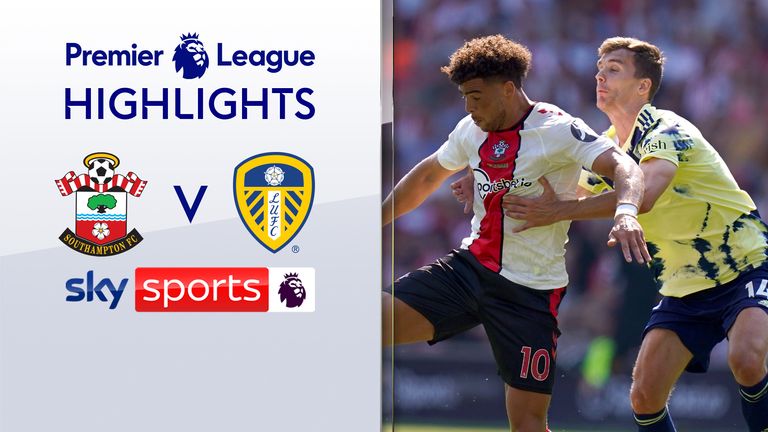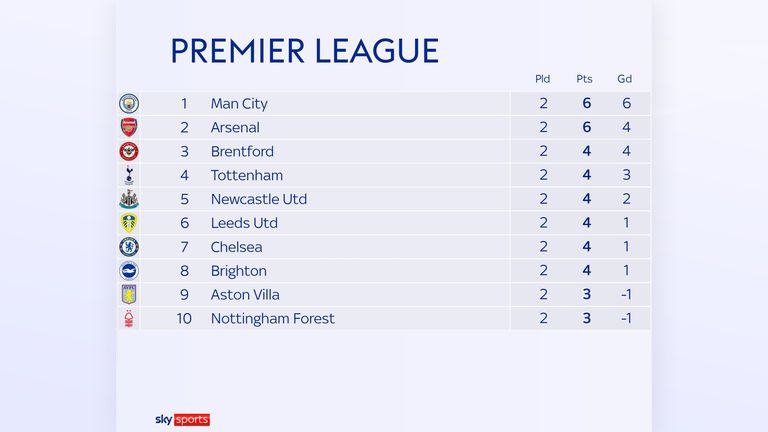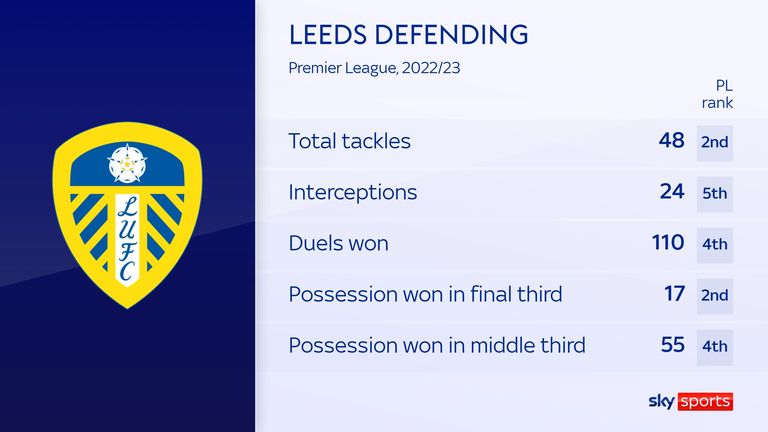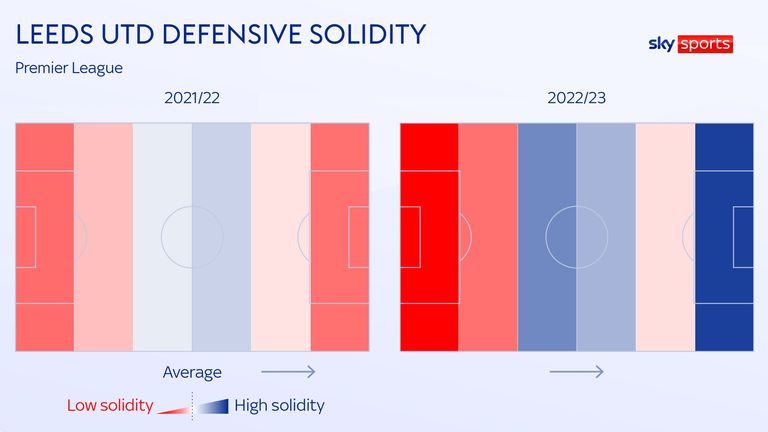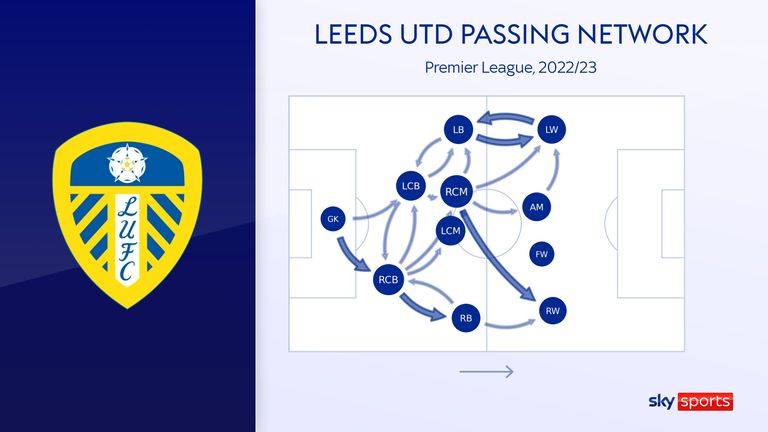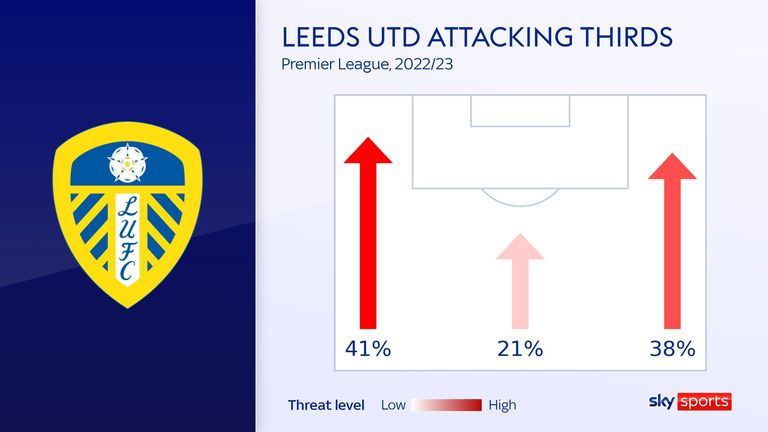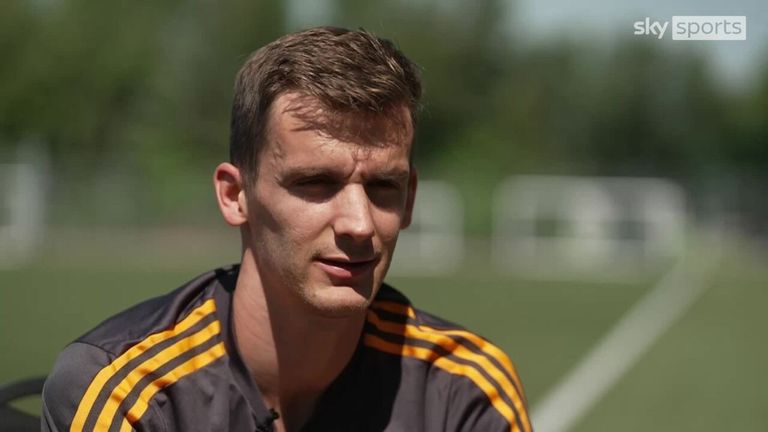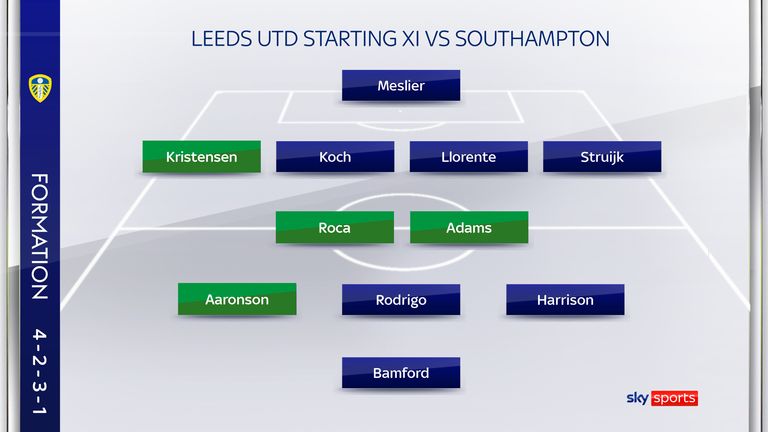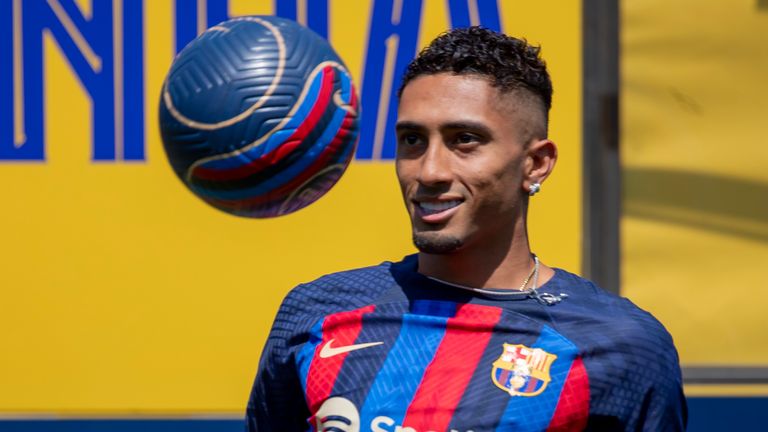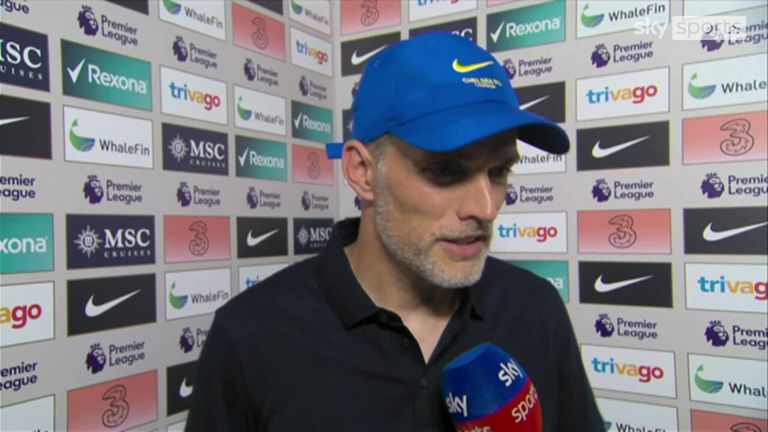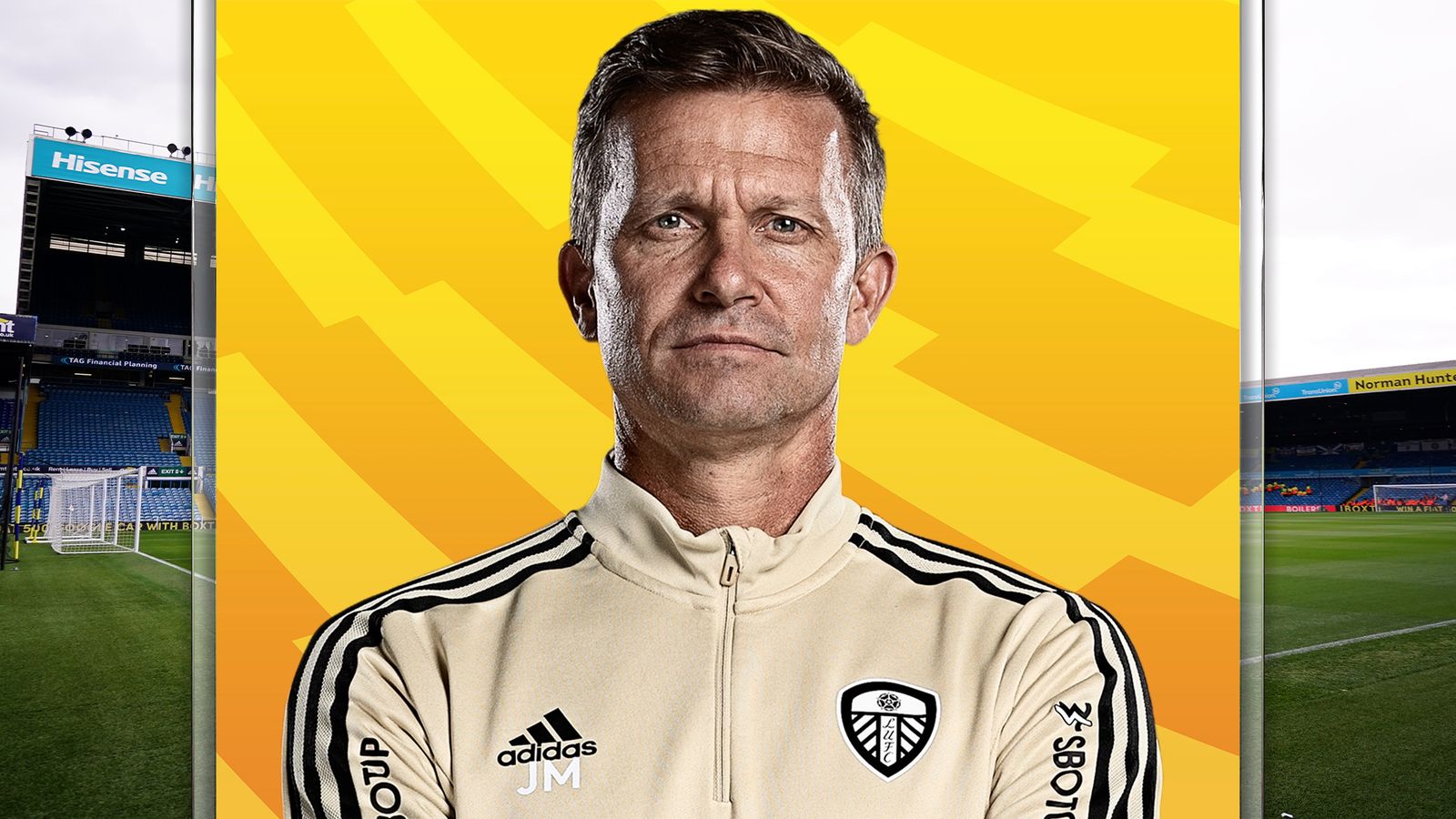
Leeds narrowly avoided relegation last season and lost their two best players in this transfer window – but the club has evolved and Jesse Marsch is at the heart of it all.
Speaking exclusively to Sky Sports, the former RB Leipzig manager reveals his insights on tactics, transfers, early impressions and the challenge of hosting Thomas Tuchel’s side this Sunday.
Marsh replaced Marcelo Bielsa at the helm in February and now has both feet firmly under the table after a busy transfer window has helped shape the squad and playing style in his image, while also settling into his new surroundings.
“The Yorkshire people are incredibly friendly and genuine – whether it’s going out for dinner or getting a haircut. I’m just really enjoying the lifestyle,” says Marsch.
“And I’ll tell you what else, the weather has been really good since I came here – so I don’t know why they say the weather is bad here!”
On the pitch, Leeds enter the third round of fixtures in sixth spot after overturning a one-goal deficit to claim a win against Wolves, before losing a two-goal advantage in a 2-2 draw with Southampton last time out.
Early impressions and season targets
So what targets has the American set for his team after the club narrowly avoided the drop last term? “The goal is certainly to not be stuck in the situation we were in last season. The goal is to develop – our playing style and individually – which I think we’re already doing.
“I’m very proud of our team for how much each one of them has committed to me being here and the principles and philosophy I’m trying to instil.
“I think you’ve seen a lot of guys playing at a very high level, maybe, for some of them, at the highest of their career, and so I take a lot of pride in that – that we are developing this the right way.
“The players are investing and we are investing in them. If we do that right, then match results follow suit. That’s my football philosophy.”
High octane, pressing and risk
Bielsa’s high-risk style, which often reaped reward, and always entertainment, demanded extreme physical exertion and endurance from his players – but does Marsch intend to maintain those levels?
“In the Wolves game, we far out-sprinted them and with high intensity, but the heat in Southampton was a major factor. If you look overall, actually, when I came in, our sprints and high intensity were higher than they were under Marcelo.
“But Marcelo had far more accelerations and decelerations – and that’s partly down to [Bielsa’s style of] man-marking, where you’re following guys and trying to stay ahead of them – cutting and changing direction a lot.
“But, with us, what we want to be is really aggressive, and in pressing moments, which requires sprinting. We also want to be very good in transitions, both ways, which also requires sprinting.
“I believe in young players, so we’ve purposely built the squad in the manner we have because we want to develop our entire group. We also need young legs to play the way we want. But, believing in young players isn’t just about blind belief, it’s about them establishing themselves and then us challenging and instructing them on how to grow.
“One of the things you do see, is our numbers against the ball are higher, but lower with the ball – because Marcelo wanted a lot of running around and I want a bit more positional play. Still dynamic movement, but a little bit more disciplined in the holding positions than what he wanted. Believe me, I look very closely at these things!”
Leeds made a league-topping 23 changes at half-time last season (17 under Bielsa and six under Marsch) – which contributed to their average substitute clocking a league-topping 28 minutes on the pitch.
In part, this helped maintain their high-intensity style of play, which is best illustrated by their 6,495 season sprints being 1,220 more than any other side in the league. So will Marsch look to fully utilise the new allocation of five substitutes in every game to help maintain energy levels?
“I’ve had two matches where I’ve only used four substitutes. With this rule, I would typically use five substitutions in the past. But, this season we’ve either had a really young bench or players aren’t fully fit. So I’ve been a bit more hesitant to make the changes and made them a little bit later than I would have liked.
“The changes against Wolves were good – it helped the game. The changes against Southampton came too late. But this is one of the hardest things to do, to evaluate how to make changes and when to make them. With a lot of it, you have to use your experiences from what you’ve seen in the match to know how to use players the best way you can.”
In terms of Bielsa’s high-risk legacy, the stats suggest Leeds maintain their attacking intent. In fact, the Yorkshire side appear to be pushing even higher upfield under the American.
On average, Marsch’s men have started passing sequences around 46m from their own goal this season – only Manchester City and the transformed Newcastle exceed that distance.
While Leeds produced league-topping numbers for sprinting in both seasons since returning to the top flight, the team’s rigorous press proved far less effective last term as opponents frequently carved through midfield and exploited spaces.
However, Marsch has restored solidity in the centre of the park and Leeds rank among the elite for reclaiming possession in the middle and final thirds this season – despite the disappointment of letting a two-goal lead slip at Southampton.
The graphic below highlights how effective these changes have been, with blue shades indicating a higher level of solidity in key areas of the pitch this season.
Advanced data metrics also reveal Leeds currently rank third in the division for restricting opposition to the fewest passes before making a defensive action, and rank fourth for winning high turnovers.
Marsch explains how the team’s progression upfield and controlled pressing are intrinsically linked. “This is what we talk about constantly,” he says. “We have different pressing strategies and it’s not just based on formations, it’s based on what the opponent presents and where we want to overload the match – with and without the ball.
“With the ball, we have been so much more effective and so much clearer in build-up phases and in moments of unbalancing the opponent and asking them more questions on how to defend us in different ways.
“We’ve created more variability, in terms of how we move from four at the back to three, to how many players we position higher up the pitch, in the midfield, and how we overload areas to gain advantages.
“A big term we always use is counter-press and how we arrange ourselves and what we do when we move the ball. So, in all moments, we try to have strategies and create clarity as to what individual roles are and how they impact each other, and then how that fits within match plans and what opponents are presenting.
“The better we get at that, hopefully, the better we can manipulate and control matches.”
A busy window
It would be easy to frame the story of Leeds’ summer transfer window negatively after the club sold, arguably, their two key players in Kalvin Phillips and Raphinha to Manchester City and Barcelona, respectively.
However, those departures generated £105m combined and the club have splashed £95.4m of that income on new players, including Luis Sinisterra, Brenden Aaronson, Tyler Adams, Marc Roca, Rasmus Kristensen and Darko Gyabi.
The most expensive acquisition, Sinisterra, cost a cool £25.4m from Feyenoord. Although he has had game time curtailed due to injury so far, does the winger possess similar attributes to former fan favourite Raphinha, who completed a £55m switch to Barcelona this summer?
“Raphinha is unique, but Luis has the ability to run and to play one versus one,” Marsch said. “He’s a really intelligent footballer, specifically with the ball and in tight spaces – and he’s also a finisher. So, I could see the comparison with Raphinha, but they’re quite different, too.
“We’re really excited about him. It’s been a shame he picked up the injury against Palace because we want to get him going and integrate him into our team. I think he’s going to create combinations and last plays and he plays with intensity – he’s fast and works hard.
“Time will tell but I wouldn’t want to put that kind of burden on him, to be Raphinha – but I think he will prove to be a very valuable player.
Aaronson, Adams and Kristensen were all signed from Marsch’s former RB teams, so did the clubs’ playing styles help convince the American they could adapt to the English game?
“Those three players have all now ingrained in the tactical and behavioural type of football we want. When we’re looking at adding players to our team, it’s all about adaptation: to the team and to the league.
“So, we like players to have either had experiences in playing the way we are trying to play now and, also, that they have natural behaviours – that’s a big part of scouting.
“Finding players that exhibit the natural behaviours [is helpful], because it’s easier to teach those players tactics when they already naturally have them, rather than to teach them from scratch with something they are not equipped with.
“And then, obviously, league experience. So, in the moment, we’ve opted for more players outside this league but they understand exactly what the tactics are.
With such a chequered history of success and failure for players coming from the Eredivisie and Bundesliga, how does Marsch evaluate the risk of whether these players can adapt to the English game?
“I’m new to the Prem, but my experience, overall, is if you find the right kind of people and players, and they are already exhibiting the behaviours you want, then the adaptation process is much faster and steeper. Of course, it’s also my job to help teach them about the league and what the demands are.
“Then it’s about adaptation to the level of the league, and all of our new players have said: ‘Wow, the league is good’, and I’ve said: ‘Yeah, it’s great to be here’.
On paper, the club still have a marginal net profit from transfer dealings this summer, so does Marsch foresee more incomings before the window slams shut on September 1?
“We’re trying to. Behind the scenes, we’ve been very active. We’re trying to find ways to continue to find the right people. I fully trust the people I’m working with. It’s a lot of work and conversations.
“Sometimes, when nothing comes of it, you feel like it’s almost wasted time – but it’s the only way to get through transfer windows is to just constantly communicate with agents and players and inside clubs. So there’s still time.
“We know we need an attacking player. We feel better about the left-back situation because Pascal’s played so well. But you’re always just looking to seize opportunities – something might pop up that is unexpected.
“We’ve done a good job at bringing players in early, to make decisions early – but we’ve left enough room to also be flexible enough to capitalise on situations that could be advantageous.
“If you looked at the length of our players’ contracts here, Leeds are either top or close to it. We have a good, young team with a lot of potential and room for growth and we’re committed to working with these guys for a long time and hopefully we can all have a lot of success together.”
Chelsea challenge
After collecting four points from their opening two games, Leeds now face a ‘big six’ powerhouse when they host Chelsea in front of the Sky cameras on Super Sunday.
The Blues dominated Tottenham last time out in a feisty 2-2 draw at Stamford Bridge – so how does Marsch and his raft of new additions intend to prevent their upcoming visitors from dictating the game?
“The Premier League is watched by everyone, so I don’t have to explain to the new players who Koulibaly is, who Mendy is, Mason Mount – they know these players, inside and out. That’s an advantage. Maybe Chelsea need more time to understand us!
“When I was going through the scouting videos with the team today, I started saying. ‘Yeah, he’s a good player’ and then, ‘They’re all good’, so, obviously, if you take a player like Jorginho, what I like about him is it’s not just that he’s technically and tactically so gifted, he’s also so intelligent.
“But you could go down the list! Koulibaly was always one of my favourite centre-backs. We played against him in Salzburg when he was at Napoli and then, of course, Chelsea pick him up – in the way Chelsea do with their ability to evaluate talent and having the resources to get them.
Chelsea players were notably fluid positionally, in and out of possession, against Spurs – something Manchester City have been effective at doing for some time under Pep Guardiola – but is this fluidity becoming more common in the Premier League?
“I would say it happened a lot anyway, but maybe it’s becoming more prevalent,” says Marsch. “The job of a manager is not to just have a style of play and sit on it. I think it’s our job to evolve, to help our teams’ evolve.
“For us, we’ve had a lot more variability in build-up and pressing and in tactics and movement and it’s about educating your team about the principles and then applying them to tactical models.
“So, I appreciate Pep is one guy who does that really well, but everyone is, too. I watched Chelsea’s first two games carefully and I was impressed that they almost played with two different systems, and in two different ways, and it can always be a good thing.
“Thomas Tuchel was right in saying after the match, saying it was a brilliant match for them, because they played really well and were very clear in all phases of the game.
“And now it’s our job to make them not be so comfortable, that’s why we like to play against the ball and play intense, pressing football, because we want to make, even the best opponents, a little bit more uncomfortable than they usually are.
“Things will have to go our way on the day, we have to be at our absolute best, but we like our team and it’s a good time to have an exam like this.
“So, the challenges for a match like this are very big for us, but I’m excited about it. I’m excited because I believe we have a team that’s more prepared for what this challenge will be and I think we have a chance.”
You can watch how those chances unfold in front of the Sky cameras this weekend, when the first instalment of a double-header Super Sunday gets under way – with the action kicking off at 2pm.

